
AI pinpoints new anti-aging drug candidates More than 70% of the drugs identified by artificial intelligence extended the lifespan of C. elegans worms.
May 29, 2025
LA JOLLA, CA Everyone wants to slow down aging but despite decades of research, truly effective anti-aging drugs remain elusive. Most drug discovery efforts for aging have focused on targeting single biological pathways, an approach that often falls short against the complexity of the aging process.
Now, scientists at Scripps Research and the biotechnology company Gero have used artificial intelligence to identify drugs that combat aging by targeting multiple age-related biological pathways at once. In their new study, published in Aging Cell in May 2025, more than 70% of the anti-aging drugs identified by an AI tool significantly extended the lifespan of the microscopic worm Caenorhabditis elegans. This also demonstrates that AI can successfully guide the design of drugs that work through this complex mechanism.
This study shows that artificial intelligence can help us go beyond the traditional one-drug, one-target' mindset, says co-senior author Michael Petrascheck, professor at Scripps Research. By embracing the complexity of polypharmacological targeting, we were able to identify compounds that produce stronger and more reliable effects on lifespan than anything we've seen in previous screens.
The research team embraced an approach known as polypharmacology the idea that many of the most effective medicines in use today work by interacting with multiple proteins at once. Often, this can be undesired, leading to side effects. But when it comes to conditions like aging that affect many biological systems at once, Petrascheck and his colleagues thought hitting different targets at once could be an advantage as long as those targets were carefully selected.
Living systems are incredibly resilient both to damage and to interventions. Think of a machine with many backup systems: turning off just one switch rarely does much. But if you press the right combination of switches, you might get a major change, says co-senior author Peter Fedichev of Gero.
The group used a type of AI tool known as a machine learning network. They gave the network access to previous studies on C. elegans' longevity, as well as databases of known drug mechanisms. They focused on drugs known to target specific proteins dopamine, serotonin and histamine receptors linked to aging processes. The model then identified existing drugs that it predicted to act on all three targets simultaneously.
When the researchers tested 22 of the compounds identified by the model in worms, 16 of them extended lifespan. One, a novel compound not currently in clinical use, increased the lifespan of C. elegans by 74%. Several FDA-approved drugs, including two antipsychotic medications used to treat schizophrenia, also performed especially well.
The new data will likely not lead to the immediate human use of any existing drugs to combat aging clinical trials to study their full effects would be needed but verifies both the overall benefit of polypharmacology in anti-aging as well as the key involvement these targeted brain pathways have in aging.
The team adds that the results also pave the way for an expanded use of artificial intelligence in polypharmacological design. While the current study focused on existing drugs, future studies could ask AI models to design completely novel drugs that aim to simultaneously target multiple pathways. Ultimately, the work could help lay the foundation for next-generation therapies that address age-related diseases such as Alzheimer's, cardiovascular disease or frailty not by targeting a single mechanism, but by nudging multiple biological systems at once.
In addition to Petrascheck and Fedichev, authors of the study, AI-Driven Identification of Exceptionally Efficacious Polypharmacological Compounds That Extend the Lifespan of Caenorhabditis elegans, include Khalyd Clay of Scripps Research; and Konstantin Avchaciov, Kirill Denislov and Olga Burmistrova of Gero.
This work was supported by funding from the National Institutes of Health (R01 AG067331 and R01 AG069206).
Neuroscience Petrascheck, Michael
More from Scripps
24/12/2025
Scripps Research study links sleep variability with sleep apnea and hypertension How consumers' digital activity trackers could enable personalized health s...
23/12/2025
New technique lights up where drugs go in the body, cell by cell Scripps Research scientists developed a technique that maps drug binding in individual cells th...
20/12/2025
Study reveals a key hormonal circuit in the kidneys Scripps Research scientists identify the protein that helps kidney cells regulate renin, providing foundatio...
19/12/2025
Nanoparticle vaccine strategy could protect against Ebola and other deadly filoviruses Scripps Research scientists turn nanoparticles into virus showcases to ...
12/12/2025
Scripps Research team pioneers an efficient way to stereoselectively add fluorine to drug-like molecules A new method uses a novel catalyst and inexpensive fluo...
09/12/2025
An easier approach to recreate the powerful nerve-blocking molecule found in shellfish A Scripps Research-led study resolves the challenge of synthesizing saxit...
04/12/2025
Scientists find cancer weak spot in backup DNA repair system New findings from Scripps Research reveal how certain tumors survive DNA damage and point to a stra...
19/11/2025
Scripps Research scientists receive $1.1 million to advance AI modeling for HIV vaccine development New AI system helps scientists rapidly pinpoint the most pro...
14/11/2025
Scripps Research study reveals how uterine contractions are regulated by stretch and pressure during childbirth Molecular insights could lead to improved labor ...
06/11/2025
Scripps Research team identifies sugar molecules that trigger placental formation Study reveals how sugar-protein interactions are critical for the placenta dur...
04/11/2025
Douglas W. Phillips and Steven M. Paul join Scripps Research Board of Directors Finance and biomedical leaders bring decades of experience in investment strateg...
30/10/2025
Scripps Research professor awarded $3.2 million to advance type 1 diabetes research Support from the National Institute of Diabetes and Digestive and Kidney Dis...
28/10/2025
Scripps Research awarded $4 million to advance platform for neurodevelopmental disorders The California Institute for Regenerative Medicine (CIRM) grant support...
09/10/2025
Scripps Research-led team receives $14.2M NIH award to map the body's hidden sixth sense An NIH-backed effort aims to decode how the nervous system monito...
07/10/2025
Former Scripps Research assistant professor awarded 2025 Nobel Prize in Physiology or Medicine Shimon Sakaguchi is honored for his revolutionary discovery of re...
01/10/2025
Scripps Research associate professor named an HHMI Freeman Hrabowski Scholar Associate Professor Xin Jin selected for up to two five-year terms, receiving up to...
13/09/2025
Researchers find brain region that fuels compulsive drinking Study by Scripps Research scientists shows how the brain learns to seek alcohol for relief, not jus...
11/09/2025
AI model helps boost pandemic preparedness Scripps Research breakthrough reduces antibody discovery time from weeks to hours, potentially revolutionizing pandem...
06/09/2025
Researchers map key human proteins that power coronavirus replication, pointing to new treatment strategies Findings from Scripps Research reveal promising drug...
08/08/2025
Researchers identify promising new compound to treat tuberculosis Study led by Scripps Research, Texas A&M and additional institutions highlights that the world...
01/08/2025
AI model detects hidden diabetes risk by reading glucose spikes Scripps Research scientists reveal how wearable sensors and artificial intelligence could transf...
23/07/2025
Where did RNA come from? Origin-of-life scientists from Scripps Research reveal how the sugar ribose may have been selected as one of life's building blocks...
19/06/2025
Calibr-Skaggs doses first patient with switchable CAR-T cell therapy in a phase 1 trial for metastatic breast cancer CLBR001 ABBV-461 is a novel, investigatio...
19/06/2025
Two-part vaccine strategy generates a stronger, longer-lasting immune boost against HIV Scripps Research scientists' new approach combines two immune-activa...
05/06/2025
FDA approves ENCELTO, a first-of-its-kind eye implant that slows vision loss in rare eye disease Cell-based therapy with roots at Scripps Research offers new ho...
04/06/2025
Females may be more biochemically sensitive to alcohol-long before dependence sets in Scripps Research's insights into sex-based differences in brain chemis...
30/05/2025
AI pinpoints new anti-aging drug candidates More than 70% of the drugs identified by artificial intelligence extended the lifespan of C. elegans worms.
May 29,...
28/05/2025
HIV vaccine study uncovers powerful new antibody target Certain antibodies blocked nearly 70% of HIV strains, including those typically hard to target.
May 27,...
23/05/2025
Newest building on Scripps Research campus earns LEED gold rating Chi-Huey Wong Laboratories for Biomedical Research recognized for sustainable construction.
M...
20/05/2025
Genomic data shows widespread mpox transmission in West Africa prior to 2022 global outbreak Scripps Research scientists, in collaboration with researchers in N...
16/05/2025
Two HIV vaccine trials show proof of concept for pathway to broadly neutralizing antibodies North American and African clinical trials led by Scripps Research, ...
14/05/2025
Genome of near-extinct northern white rhino offers hope for reviving the species Breakthrough from Scripps Research, San Diego Zoo, Max Planck Institute and oth...
07/05/2025
Eric Topol authors book on the science of healthy aging Latest book by Scripps Research executive vice president guides readers through medical breakthroughs t...
29/04/2025
Origin of life twist: New study challenges longstanding hypothesis on how first sugars formed Scripps Research and Georgia Institute of Technology scientists�...
22/04/2025
Empowering antibodies to better activate the immune system Scripps Research scientists discover that a higher ratio of antibodies to viral protein helps engage ...
17/04/2025
A better way to predict a patient's risk of coronary artery disease Scripps Research scientists developed a model that more accurately identifies patients a...
16/04/2025
The very first structural images of a tuberculosis-fighting virus New insights from Scripps Research could advance phage therapies for the world's deadliest...
10/04/2025
FDA clears IND for clinical trial testing switchable CAR-T therapy in patients with autoimmune diseases, without chemotherapy Innovative cellular therapy has po...
08/04/2025
A gentle approach offers new hope for inflammatory lung diseases Scripps Research and aTyr Pharma scientists have revealed how the protein HARSWHEP calms inflam...
02/04/2025
How microRNAs act as a blueprint for the developing brain Scripps Research scientists reveal that microRNAs guide the development of Purkinje cells, a rare ty...
25/03/2025
Low-sugar' vaccine can provide broad immunity against coronavirus variants Scripps Research chemistry professor Chi-Huey Wong presents results from his team...
21/03/2025
How scientists uncovered memory's hidden architecture New structural hallmarks of memory storage discovered by Scripps Research could lead to treatments for...
11/03/2025
Compound found in common herbs inspires potential anti-inflammatory drug for Alzheimer's disease Scripps Research scientists created a stable form of carnos...
04/03/2025
How a crucial DNA repair protein works-and what it means for cancer treatment New structural blueprint is key for better targeting cancer cells, particularly th...
28/02/2025
How air pollution and wildfire smoke may contribute to memory loss in Alzheimer's disease Scripps Research scientists discovered how a chemical modification...
07/02/2025
Collaboration awards enable scientists to design new medicines, more precisely edit DNA and fight drug-resistant bacteria Scripps Research announces its 2024 re...
29/01/2025
Researchers illuminate new structures of a critical amyloid protein Insights could advance new drugs to treat the progressive, fatal disease known as transthyre...
24/01/2025
Long-acting injectable malaria drug enters first-in-human study Calibr-Skaggs' long-acting injectable (LAI) platform transforms oral malaria treatment atova...
04/01/2025
Virtual chemistry speeds up drug discovery By using computer modeling to predict chemical reactions, Scripps Research scientists were able to synthesize 25 vari...
17/12/2024
Brain cells remain healthy after a month on the International Space Station, but mature faster than brain cells on Earth Scripps Research scientists reveal micr...
 AI pinpoints new anti-aging drug candidates More than 70% of the drugs identified by artificial intelligence extended the lifespan of C. elegans worms.
AI pinpoints new anti-aging drug candidates More than 70% of the drugs identified by artificial intelligence extended the lifespan of C. elegans worms.



























